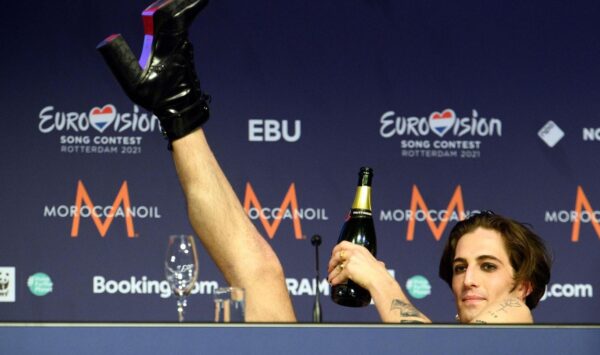If you are already experiencing the first symptoms of post Eurovision-depression, don’t worry, you are not alone. Before we go into the summer desert and impatiently wait for the beginning of the next Eurovision season, here are some of my main take-aways of the 2021 Eurovision.
Rotterdam, dank je wel
This year’s host Rotterdam delivered a high-class event which was highly anticipated due to last year’s cancellation. The Dutch broadcasters AVROTROS, NPO and NOS delivered three excellent shows on the stunning stage of Rotterdam Ahoy. The least we can say is that it was worth the long wait.
Four people hosted all three shows, much like Tel Aviv 2019, Lisbon 2018 and Vienna 2015, to recall some of the most recent years. On one hand Nikkie de Jager brought all her grace, authority, and reassuring calm. Chantal Janzen showed her long experience and indispensable skills (especially during the unforeseen interruption in semi-final 1 when one of the cameras broke as Ireland was preparing on stage) and took us through the exciting voting procedure with an iron hand in a velvet glove. However, I am far less convinced by the performance of Edsilia Rombley in and out the green room and especially of Jan Smit, who on more than one occasion seemed to be run over by the events.
Together with the previous and also not seamless 4-host experiences, this should open a larger debate on how many people are actually needed to conduct the three live shows. I am aware that not every country can provide us with their own Petra Mede, but I do believe that less is more when it comes to hosting.
The shows
AVOTROS, NPO and NOS decided that every show deserved the same level of attention. I appreciated that. Whereas in some of the past editions broadcasters considered the two semi-finals a simple and less-worthy introduction to the Grand Final, this time I found the shows on Tuesday and Thursday possibly more engaging than the one on Saturday.
Duncan Laurence’s opening on semi-final 1 was simply exceptional and was effectively treated as the ouverture of the 2021 Eurovision. Both interval acts in the semi-finals were of high quality and did way more than keeping us busy during the voting procedure.
Unfortunately, I did not find the interval act of the Grand Final equally entertaining. Once again, I know how hard it is to keep up with Riverdance and Love Love Peace Peace, but bringing old Eurovision winners to perform their entries over and over again does not come as a surprise anymore. I hope that future broadcasters will seek innovative and off the beaten path formulas. And yes, even if it hurts, we might want to consider a Eurovision without Måns Zelmerlöw.
The voting system
Italy won fair and square with an incredible result in the televote and a more than decent mark in the juries. The Italian rock scene has long been seeking a broader continent-wide recognition and it is to me well deserved. France battled until the very end coming second in the jury vote and third in the televote. Switzerland surprised a few by topping the jury vote and still did well in the televote. There is very little to discuss at the top of the scoreboard.
However, the voting made me raise my eyebrows a few times. The Greek-connection exchanged the maximum amount of 48 points. Considering Greece and Cyprus together, six of the 10 jurors put the other country first. Nobody ranked either El Diablo or Last dance lower than third.
The jurors from Russia also voted homogeneously, all putting Moldova either first or second (looking at you, Kirkorov!). A lot was apparently going on between Moldova and Bulgaria, also swapping their 12 jury points. Here again 6 of the 10 jurors ranked the other country first. The latter exchange is far more interesting because the top mark from the jury was followed by a nil pointer from the televote of both countries.
Let me be clear: I am not trying to draw any kind of judgement here. I am simply laying down the votes available on eurovision.tv. It is impossible to reach a consensus on the voting system. Many advocate to scrap the juries. Others want to limit or impeach the televote to avoid the dreadful diaspora voting of the early 2000s. The most recent system with two separate announcements has at least the merit of being more transparent. The EBU should however further work to enhance fairness and clarity in the voting procedure.
The fandom
I have observed with scepticism the rise in recent years of an overly excited fandom, essentially structured around a few powerful Eurovision websites. This fandom has built and maintained the hype around a few entries throughout the season. On one hand the excitement towards Italy, France and Switzerland is reflected in the excellent results of the live shows. Indeed some other performances did not have the outcome many in the core fanbase would have expected or desired.
Malta and Bulgaria were among this year’s favourites. In the Grand Final Malta ranked third in the jury vote and Bulgaria sixth. So far so good. Things start getting interesting with Malta landing fourteenth in the televote and Bulgaria even worse, eighteenth. Late-bloomer Portugal, seventh in the juries and nineteenth in the televote, present a similar pattern. Such differences in the split vote deserves at least a reflection.
Malta’s result is to me the most appalling. Destiny’s performance on Saturday was worth of a Grand Final, but the 47 televote points for the winner of the 2021 OGAE poll should make us think. I do have the impression that the fandom has increasingly drifted away from the average Eurovision first-time viewer. The main reason however should not be sought in a radicalisation of the fanbase. It is to me rather the broader and genre-diverse audience that the Eurovision has been able to conquer over the last years. The Eurovision Song Contest has finally moved away from the Englishvision trap which produced a long list of equally mediocre entries to embrace diversity.
The Big-5 dilemma
This year’s Big-5 result is without appeal. Italy and France ended up in the top 2 because they simply wanted to win this year’s Eurovision, badly. On the opposite side of the scoreboard, however, we find the other three members of the Big-5 plus the Netherlands.
We can’t judge the strategy of the Big-5 members as a whole. However, we can at least criticise the attitude of some of them. The United Kingdom, Spain and Germany have all been ranking very poorly since the introduction of the Big-4 in 2004. The sole notable exception is the German victory in 2010.
This year’s results and especially the double nil pointer of the United Kingdom should righfully outrage more than a few in the countries that failed to qualify for the Grand Final (i.e. Croatia). It is clear to me that some Big-5 members have no real interest whatsoever in the Eurovision Song Contest. Sending an alibi song and participate directly in the Grand Final guarantees some 10 hours of live television on prime time at a convenient price. This comes at the expenses of quality. It also directly damages other contestants which must fight for their place in the Grand Final, often failing.
It is time for the EBU to address the elephant in the room and review the Big-5 policy. The previous Eurovision winner should be the only automatic qualifier as a reward. Everyone else should start from the semi-finals and earn their way through. This is a competition, after all.




